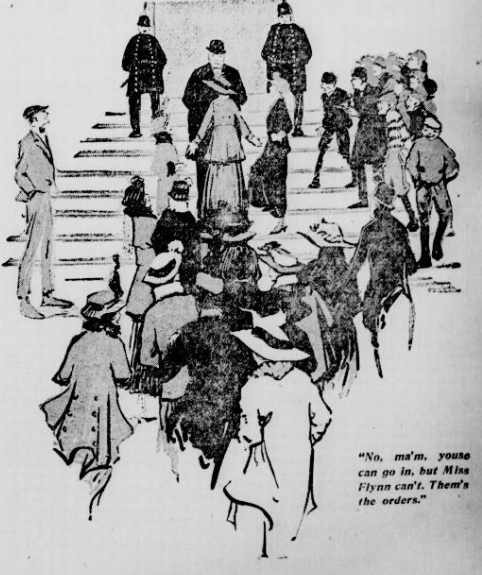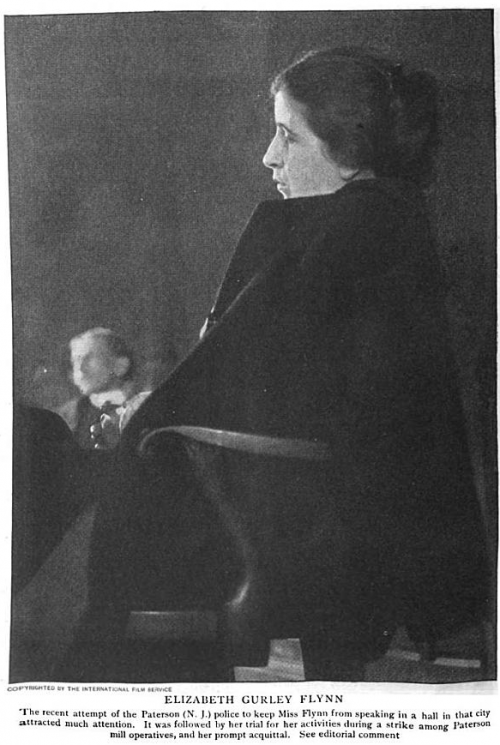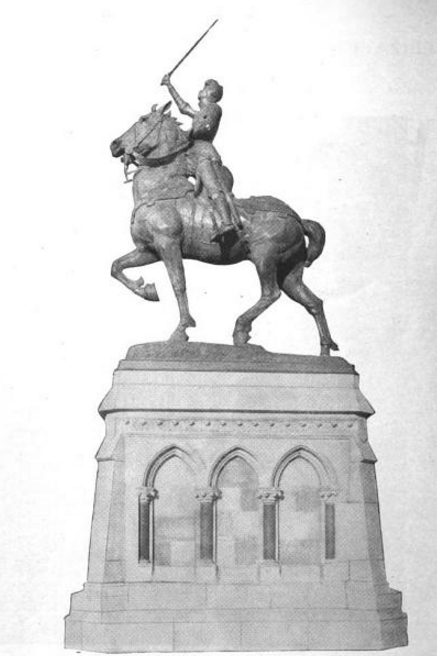Hellraisers Journal: Gurley Flynn, Labor's Joan of Arc, "Left Paterson Authorities Still Afraid"
She’s a little woman, is Gurley Flynn, and Irish all over.
The Celt is in her gray blue eyes and almost black hair,
and in the way she clenches her small hands into fists when she’s speaking.
~~~~~~~~~~~~~~~~~~~~~~~~~~~~~~~~~~~~~~~~~~~~~~~~~~~~~~~~~~~~~~~~~~~~~~~~~~~~
Thursday December 16, 1915
From The Outlook: Elizabeth Gurley Flynn, Labor's Joan of Arc, Feared by Paterson Authorities
An editorial from yesterday's Outlook defends Miss Elizabeth Gurley Flynn, whom the silk workers call: "Labor's Joan of Arc." The Outlook supports Gurley's right to free speech in the city of Paterson, although they consider her and members of her organization, the Industrial Workers of the World, to be radicals and agitators. Yesterday's editorial follows an article from the November 24th edition which detailed the invasion of Paterson on November 11th by Miss Flynn and a group of prominent New York women. On that day, the Chief of Police stood before the door of the hall and refused to allow Miss Flynn to go inside to speak to the working men and woman of that city. We present, today, both offerings from The Outlook, beginning with the article of November 24:
FREE SPEECH IN PATERSON“You may have the right, but we have the power,” wittily retorted the Chief of Police of Paterson, New Jersey, last month as he hustled Elizabeth Gurley Flynn from a public meeting and put her onto a train going back to New York City.
They had the power again recently [evening of November 11th], when Miss Flynn, accompanied by a score of New York women, returned to a hall previously hired for a protest meeting on the violation of the rights of assemblage and free speech.
On the steps, as they attempted to enter, stood a large, stout man, without badge or uniform, who said he was a police captain and had orders to prevent Miss Flynn (or any other I. W. W. leader) from going in. No, he wouldn't arrest her—not even if she wanted him to. His orders “was to keep her out of the hall.” He “wasn’t there to argue.” But “the people of Paterson don’t want to hear Miss Flynn speak,” and they “ain't a-goin’ to, either,” said their stout protector, firmly. “No, I don’t know anythin’ about free speech; we have legal speech in Paterson,” he explained, as he settled himself more solidly before the small Irish girl of whose power Paterson authorities thought so highly.
“Legal speech!" shrilled a dozen excited women grouped around Miss Flynn. “What’s that? Who's to tell what’s legal for Paterson? What’ll you do if we try to take her in by force?”
“Awl what’s the use, ladies?” said the stout man, persuasively. “Please don't try to start anything; it would be mighty unpleasant.”
The trouble came as an aftermath of the big silk strike in Paterson in 1913. Since then the police and local authorities have determined to prevent another by forbidding organizers of the Industrial Workers of the World to speak to the mill operatives. As they frankly admit, they are acting illegally; the orders are to make no arrests-simply to pick up the offending parties and forthwith bundle them onto an outgoing train.
Elizabeth Flynn is a little woman, the best known, presumably the worst feared, of radical labor leaders, and one whose friends outside of the organization are many. Her abortive attempt to speak last week grew out of the indignation of these friends, many of whom, like Mrs. J. Sergeant Cram, Mrs. Amos Pinchot, Mrs. Robert Bruère, Mary Austin, Mary Heaton Vorse, Mary Chamberlain, and Mrs. Edwin Bjorkman, are far from the class of professional agitators or identified with any labor movement. They said they thought it unlikely that Miss Flynn, who that day had been received by the President of the United States on another matter, would be forbidden her Constitutional rights of assemblage and free speech. They were to find that “What's the Constitution among friends?” still holds in Paterson.
While the burly captain and the little labor leader were confronting each other on the steps of the hall—a strategical position they occupied for nearly two hours-inside the meeting waxed warm, then heated, and finally boiled over with indignation. An audience of more than two thousand working people applauded vociferously every time one of the women on the platform denounced the “reception committee ” outside who were “entertaining our guest of the evening so thoroughly that she is unable to be with us here.”
A resolution appealing to President Wilson was passed with a cheer, and a rising vote of thanks given to the "women of New York for coming to the help of their brothers and sisters in Paterson.” Verbal fireworks and artillery were constant. So excited did the good ladies in charge become that they allowed the meeting to close in a burst of oratory before any one remembered that no collection had been taken to go toward the fund necessary to procure an injunction against the corpulent police of Paterson. “We’ve got to win this fight,” declared one public school teacher, “or l’ll never have the face to teach American history again;” and another, a noted psychologist and writer, said that she would immediately begin an inquiry into “The Influence of Fear on the Minds of Municipal Authorities.”
The account given above was written for The Outlook by an eye-witness of the incident described. A most effective way of endangering law, order, and the rights of property is for the defenders of those rights to adopt illegal and unjust methods towards their opponents. The case of Russia proves that the practical anarchy indulged in by Government official is far worse for a country than the theoretical anarchy of radical propagandists.
[Drawing added.]
From The Outlook of December 15, 1915:
In the photograph section of this same edition we find a photograph of Miss Flynn, taken during her recent trial in Paterson:
Outlook Editorial.
ELIZABETH GURLEY FLYNN: LABOR LEADERThree weeks ago, under the title “Free Speech in Paterson," The Outlook told the story of the second expulsion from Paterson, without any legal proceeding, of Elizabeth Gurley Flynn. Later she was put on trial on a charge of exciting riot and lawlessness by a speech made long ago. She was acquitted, and her followers, and many also who do not at all agree with the propaganda of the Industrial Workers of the World, of which she is an exponent, regarded her acquittal as a victory for free speech. What manner of woman is this labor leader, just now so prominent in the public view? We have asked one who knows her to tell our readers. A portrait appears in our picture section [See above].-THE EDITORS.
WHAT is she—this Elizabeth Gurley Flynn, who was tried again in Paterson last week and quickly acquitted? A strange sort of woman, so hated that a city's lawful authorities frankly break the law to keep her out, so championed that society women, factory girls, teachers, writers, lawyers, poor students, and folks who never saw her “chipped in ” to raise her a defense fund—what is she?
To silk-mill owners and capitalists generally she is “that Flynn woman, loud-mouthed agitator, grafter, seditious criminal, who ought to be run out of town or hanged.” All they know is that when she comes their factories fall idle and empty and their workers, thronging about a woman, swear they won’t go back until the woman tells them to. So the factory owners refuse to talk over the strike with this woman, and soon she is arrested and tried, sometimes for one thing, sometimes another.
She’s a little woman, is Gurley Flynn, and Irish all over. The Celt is in her gray blue eyes and almost black hair, and in the way she clenches her small hands into fists when she’s speaking. On her mother‘s side her great-grandfather Ryan was killed in battle with the English, and her grandfather Flynn fled to America with a price on his head for sabotage against the British Government. “Sabotage in Fenian days?” one asks, and Miss Flynn smiles as she explains that when forbidden their immemorial right of fishing in certain rivers he and his associates poisoned the streams, saying, “If we can’t have our own, neither shall the English.”
Sixty years later Miss Flynn finds the wrongs of the proletariat more moving than the cause of Irish nationalism, but her antagonism to constituted authority seems inbred. She was reared without a girlhood, with almost no childhood, for at fifteen she made her first speech as a “materialistic Socialist” before her father’s club. At seventeen she and he were arrested for cart-tail speaking in New York City. Here is her own curt schedule from that time: “I have been arrested once in New York, once in Missoula, Montana, once in Spokane, Washington, twice in Philadelphia, twice in Paterson, never convicted.”
Elizabeth Flynn in the past four years has led three big strikes: the struggle of the textile workers in the mills of Lawrence, Massachusetts; then a short but bitter waiters’ strike in New York City; and in 1913 eight months of war between the silk-mill owners and their employees in Paterson, New Jersey. In each struggle. she says, she has made herself hated and feared by those she calls “ masters," while those she derides as “exploited” love and trust her. In Lawrence they trusted her even with their little ones. Like the Pied Piper, she left the city followed by the children of the workers, whom she carried off to New York to be fed and cared for until the strike was won. “Labor’s Joan of Arc” they call her, and one, an Italian, said of her: "Women and children, and any man that lika mother and sister, lika Miss Flynn and listen.”
In Paterson she has left the authorities still afraid. Since the strike “Gurley" has been forbidden to speak to the working people. When she persisted, an old indictment was revived against her. Although the Judge before whom she was tried was the same who watched the police bar her from a meeting, and these same police were witnesses against her, a jury from another county promptly acquitted her. Her defense had been undertaken by a committee of women none of whom was identified with industrial disputes. Their support could be explained only by their belief in the sincerity of the labor leader whom they called friend. Now that she is free they seek an injunction to make the legal authorities of Paterson obey the law.
[Emphasis added.]
On the page facing the editorial, is found a photograph of the recent unveiling, in New York City, of a statue of Joan of Arc:
SOURCES
The Outlook
(New York, New York)
-Nov 24, 1915
https://books.google.com/books/reader?id=vH-CMUXDjLEC&printsec=frontcove...
"Free Speech in Paterson"
https://books.google.com/books/reader?id=vH-CMUXDjLEC&printsec=frontcove...
-Dec 15, 1915
https://books.google.com/books/reader?id=vH-CMUXDjLEC&printsec=frontcove...
"Elizabeth Gurley Flynn: Labor Leader"
https://books.google.com/books/reader?id=vH-CMUXDjLEC&printsec=frontcove...
Sources for date of meeting
New York Times of Nov 10, 1915:
Includes "New York Women Back Miss Flynn"
..."protest meeting..Paterson..tomorrow evening to support" EGF.
http://query.nytimes.com/gst/abstract.html?res=9D07EFD91239E333A25753C1A...
The New Castle [PA] Herald of Nov 12, 1915
Paterson police prevented EGF from speaking "last night."
https://www.newspapers.com/image/76762834/
IMAGES
Elizabeth Gurley Flynn, Free Speech at Paterson, Invasion of
NYC Women, NY Tribune, Nov 21, 1915
http://chroniclingamerica.loc.gov/lccn/sn83030214/1915-11-21/ed-1/seq-31/
Elizabeth Gurley Flynn, Paterson Trial, Outlook, Dec 15, 1915
https://books.google.com/books/reader?id=vH-CMUXDjLEC&printsec=frontcove...
Joan of Arc Statue Unveiled, Outlook, Dec 15, 1915
https://books.google.com/books/reader?id=vH-CMUXDjLEC&printsec=frontcove...
See also:
New York Tribune
(New York, New York)
-Nov 21, 1915
"The Ladies Tilt Their Lances at Free Speech Dragon"
http://chroniclingamerica.loc.gov/lccn/sn83030214/1915-11-21/ed-1/seq-31/
Hellraisers Journal: Elizabeth Gurley Flynn & Mrs. Cram
Meet with President Wilson on Behalf of FW Joe Hill
http://www.caucus99percent.com/content/hellraisers-journal-elizabeth-gur...
```````````````````````````````````````````````````````````````````````````````````````````````````






Comments
Descriptions of women never seem to change.
Even when praising a woman's efforts the editorial just HAS to comment on her appearance.
I do not pretend I know what I do not know.